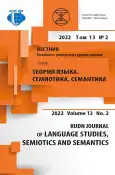Stylistic Use of the Grammatical Tense Category in the Middle English Prose
- Autores: Vyshenskaya Y.P.1
-
Afiliações:
- Herzen State Pedagogical University
- Edição: Volume 13, Nº 2 (2022)
- Páginas: 416-432
- Seção: COGNITIVE RESEARCH
- URL: https://journal-vniispk.ru/2313-2299/article/view/323505
- DOI: https://doi.org/10.22363/2313-2299-2022-13-2-416-432
- ID: 323505
Citar
Texto integral
Resumo
The paper proposes some observation experience over exploring stylistic resources of the verbal category of tense in the texts of English belles-lettres presented by its prosaic segment dated by High Middle Ages period. Acquiring by the prosaic form of the belles-lettres text the independent status is the important step in the History of European Literature which chronologically coincides with the period of transferring from Middle Ages to Renaissance. After passing the formation period there appeared verbal coverings of one and the same contents different in stylistic, lexical and grammatical characteristics as well as the use of the national language. In consequence of the consciousness secularization, works of literature characterized by practical appropriation of reality, take some practical orientation. This, in turn, causes some necessity in new ways to describe «tactile materiality of consciousness». The category of tense is chosen as the investigation object by virtue of its dependence on proper to textual structures’ contents and compositional features. The work of literature text continuum is considered as distributed into chronological plans reflected in the verbal tense forms. The period of transferring from the Middle Ages to the Renaissance, the period of translation, supposes establishing evaluative correspondences in the stylistic orientative activity with some etalon presented by the antique rhetorical tradition. Style generating processes in the textual space of English literature, facultative when compared with French belles-lettres, are marked by putting on th etalon position the French rhetorical tradition as well. The most eminent instances of the tradition can be found in the romance genre as one of the most representative in the European literary genre system. The English genre variant is used as illustrative material for the analysis procedure done.
Palavras-chave
Sobre autores
Yuliya Vyshenskaya
Herzen State Pedagogical University
Autor responsável pela correspondência
Email: clemence_isaure@rambler.ru
ORCID ID: 0000-0003-2870-3026
Ph.D, Assosiate Professor of the Department of English Language and British Studies
48, block 14, the Moika Embankment, St.-Petersburg, Russian Federation, 191186Bibliografia
- Garen, E. (1986). Problemy ital’yanskogo Vozrozhdeniya [Issues of Italian Renaissance]. Moscow: Progress Publ. (In Russ.).
- Campbell, S.J. & Milner, S.J. (2004). Artistic Exchange and Cultural Translation in the Italian Renaissance City. Cambridge: Cambridge University Press.
- Dyer, Ch. (2005). An Age of Transition? Economy and Society in England in the Later Middle Ages. Oxford: Clarendon Press.
- Schlauch, M. (1964). The English Language in Modern Times (since 1400). Warszawa & London: PWN — Polish Scientific Publishers; Oxford University Press.
- Nenarokova, M.R. (2012). Carolingian Eclogue: text and Genre History. Moscow: Institute of World Literature Russian Academy of Sciences Publ. (In Russ.).
- Evdokimova, L.V. (1997). The French Prose OrigIn: Prosaic and Poetical Form in the XIII-th century French literature. Moscow: Nasledie Publ. (In Russ). (In Russ.).
- Blake, N.F. (1977). The English language in medieval literature. London, Melbourne and Toronto: J.M. Dent & Sons Ltd; Rowman and Littlefield, Totowa, N.-Y.
- Grigor’ev, V. P. (1975). Formation of Spanish National Literature Language. Leningrad: Herzen State Pedagogiacl Institute Publ. (In Russ.).
- Gordon, J.A. (1966). The Movement of the English Prose. London: Longmans.
- Shib, G. (1979). German Language during the Early Period of Bourgeois Revolution. In: Actual Matters of General Linguistics in German Democratic Republic. Language — Ideology — Society. Moscow: Progress Publ. pp. 183–222. (In Russ.).
- Corti, M. (1978). Il viaggio testuale. Torino: Giulio Einaudi editori s.p.a. (In Ital.).
- Alekseev, M.P. (1984). Medieval English and Scottish Literature. Moscow: Nauka. (In Russ.).
- Ahern, J. (2005). Dionco’s repertory: Performance and writing in Boccaccio’s “Decameron”. In: Performing Medieval Narrative. N-Y.: Boydell & Brewer Ltd. pp. 41–61.
- Baugh, A. (1948). Literary History of England. N.—Y. & London: Appleton-Century — Crofts, Inc.
- Revyakina, N.V. (1995). Humanistic Culture of Padua and the University in the End of the XIth and the Beginning of the XV centuries. In: Educational and Breeding Traditions in Europe during the Period of the XI—XVIIIth centuries. Ivanovo: Ivanovsky University Publ. pp. 56— 68. (In Russ.).
- Dante, Alig’eri (1968). Pir [Feast]. In: Operi Minori. Moscow: Nauka. (In Russ.).
- Bahtin, M.M. (1975). Issues of Literature and Esthetics. Moscow: Iskusstvo Publ. (In Russ.).
- Stepanova, L.G. (1982). Observations over Old Italian Prose Syntax. In: Syntactical Peculiarities of Literary Languages at their Early Periods of Formation. On the IndoEuropean Language material. Leningrad: Nauka. pp. 124–159. (In Russ.).
- Zumthor, P. (163). Langue et Techniques Poétiques á l’Ēpoque Romane (XI-е—XIII-e siècles). Bibiliotéque Française et Romane. Série C: Ētudes Litttéraires, 4. (In French).
- Alisova, T.B. (1963). Syntax and Style in the Process of Forming of Middle Italian Language Norm. Philology and Journalism Bulletin, 1, 46–58. (In Russ.).
- Kazumi, M. (1979). Syntax and Style in Early English. Finite and Non-Finite Clauses c. 900– 1600. Tokyo: Kaibunsha Ltd.
- Arnold, I.V. (1990). Stylistics of the Modern English. Moscow: Prosveshchenije Publ. (In Russ.).
- Semenjuk, N.N. (2000). Essays in Historical Stylistics of the German Language. Moscow: Institute of Foreign Languages. Russian Academy of Sciences. (In Russ.).
- Benvenist, Je. (1974.). General Linguistics. Moscow: Progress Publ. (In Russ.).
- D’Arras, J. Melusine. URL: https://archive.org/details/melusine00jeanuoft (accessed: 5.08.2017).
- Sabaneeva, M.K. (2001). Poertic Language of French Epic: Philological Synthesis Experience. Saint Petersburg: S.-Peterburg University Publ. (In Russ.).
- Malory, Th. Syr. Le Morte d’Arthur. URL: https://archive.org/details/lemortarhuror00malouft (accessed:05.08. 2019).
- Melori, T. (1993). Le Morte d’Arthur. In: Le Morte d’Arthur. Moscow: Nauka. pp. 13–764.
- The Right and Goodly Historie of the foure Sonnes of Aymon. URL: https://archive.org/details/rightplesauntno4400caxtoft (accessed: 21.05. 2018).
- Paris and Vienne. Thystory of the Noble Ryght Valiant and Worthy knyght Paris and of the Fayr Vienne the Daughter of Vyennoys URL: https://archive.org/details/parisandviennenet00hazlgoog (accessed: 26.07. 2021).
Arquivos suplementares









